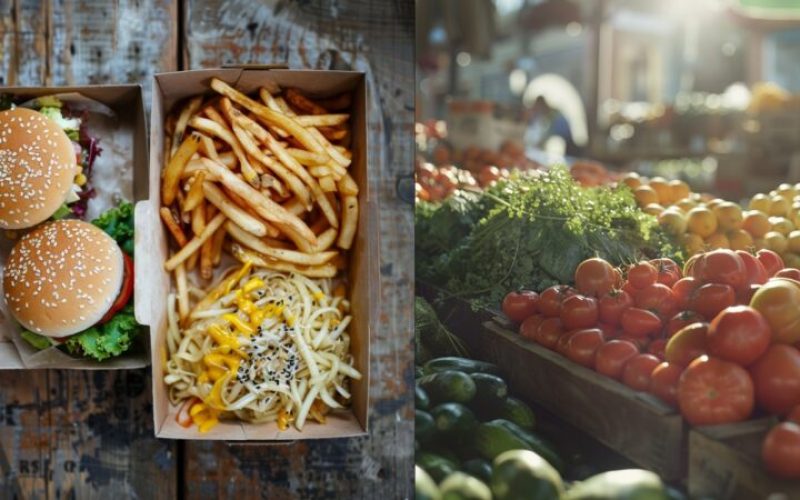In today’s world, choosing between fast food and organic meals is a common dilemma.
Fast food offers convenience and taste for those tight on time, but it often comes with unhealthy ingredients and high calories.
Organic meals, while requiring more time and effort, are made with natural ingredients and support health and the environment.
As awareness about nutrition and sustainable practices grows, it’s important to consider the benefits and drawbacks of each option.
The decision between quick fast food and nutritious organic meals depends on personal lifestyle, health priorities, and environmental values.
Let’s Start The Showdown
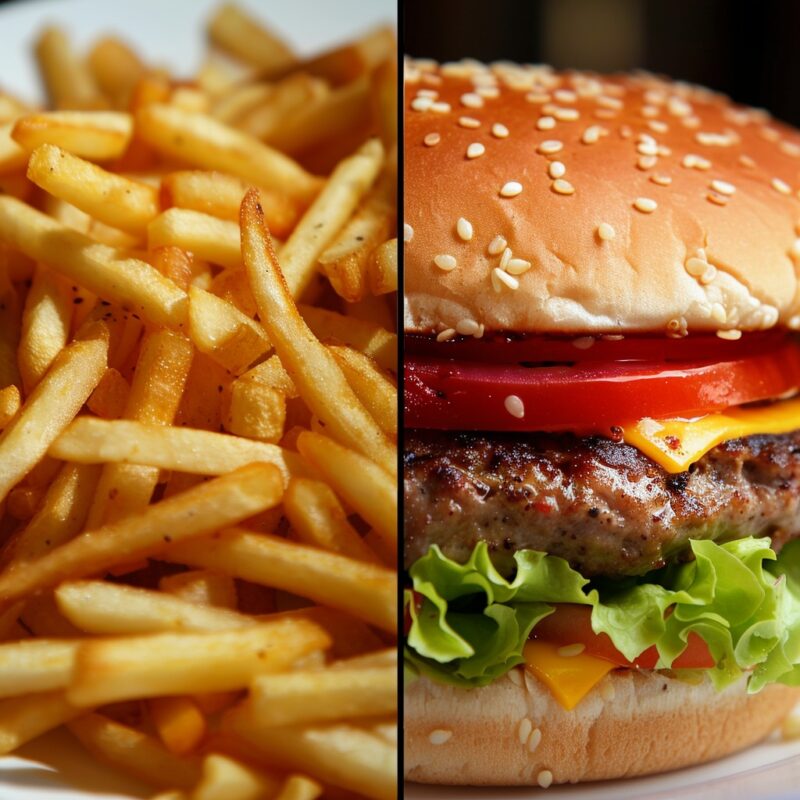
Caloric Content and Quality
Fast food often packs a lot of calories into each serving, sometimes hitting the daily calorie recommendation in just one meal.
However, the calorie count only tells part of the story. Organic meals usually offer fewer calories but are richer in nutrients.
This means you can eat more and get more from what you’re eating—think more fruits, vegetables, and whole grains.
Essentially, the calories from organic meals come from healthier sources, offering better fuel for your body.
Macro and Micronutrient Profiles
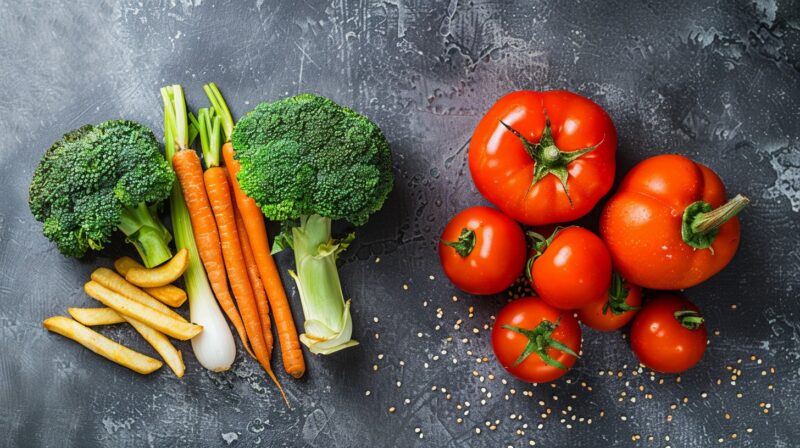
When I think about the difference between fast food and the organic meals I advocate for, it really comes down to what’s inside them.
Fast food is often loaded with simple carbs, like refined sugars, along with too much saturated fat and cholesterol.
These are exactly the kinds of things that don’t just weigh down our bodies but also our health, increasing the risk of serious issues like heart disease and diabetes.
It’s a path I’ve always tried to steer clear from, not just for myself but in the advice I share about living a more organic, earth-friendly life.
On the flip side, organic meals resonate with everything I stand for.
They have this beautiful balance of complex carbs and fiber, not to mention the healthy fats that our bodies actually need.
You won’t find those harmful saturated and trans fats here. It’s all about promoting a healthier heart and overall well-being.
Plus, the organic ingredients I cherish and use are bursting with antioxidants, vitamins, and minerals
Additives and Preservatives
Fast food’s convenience comes with a side of additives and preservatives—things like MSG, high-fructose corn syrup, and a bunch of artificial sweeteners and colors.
It’s these ingredients that give fast food its taste and long shelf life, but they’re not doing any favors for our health.
They can pack on the pounds and make existing health issues even worse.
The process of nurturing a simple garden can transform our engagement with food, revealing how real flavors make everything taste better and keep us healthier without all the fake stuff.
The 2016 study revealed that those who reported eating more fast food were exposed to as much as 40 percent more phthalates than those who ate at home in the span of 24 hours. Grain-based foods, including bread, cake, pizza, burritos, rice, and noodles, and burgers and other meat were the most significant contributors to phthalate exposure.
But when I turn to organic meals, it’s a whole different story.
I focus on using ingredients that are as close to their natural state as possible.
No synthetic additives or preservatives in sight. It means the food not only tastes better but it’s also better for you, offering a clean, wholesome eating experience
Comparing Costs
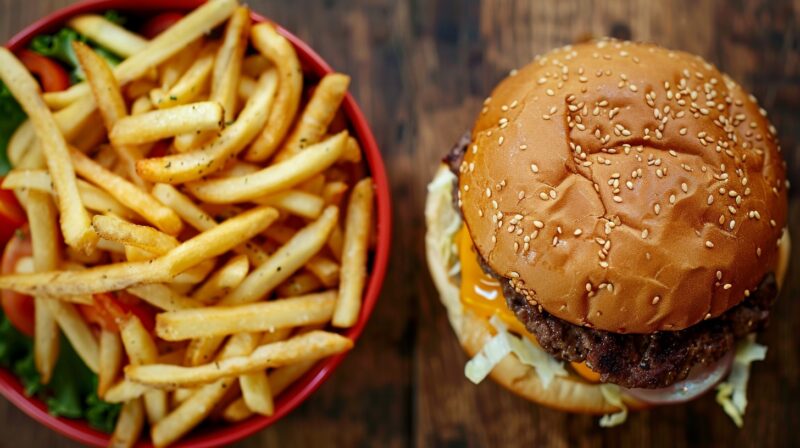
When I compare the cost of fast food to organic meals, fast food initially looks cheaper.
However, considering the health problems it can cause and the medical bills that might follow, it doesn’t seem like such a good deal in the long run. Organic food costs more upfront, but to me, it’s an investment in my health.
As for time, yes, I’m like everyone else, finding fewer moments to cook. Fast food is tempting because it’s quick and there’s no cleanup.
But when I decide to cook an organic meal, it takes more of my time. and when my health is on the line that time is worth it.!
Sustainability of Food Production
The fast food industry’s effects, like deforestation and high greenhouse gas emissions, are deeply concerning to me.
They rely on practices that hurt our planet by causing habitat destruction and contributing significantly to climate change.
On the flip side, my commitment to organic meals stems from their gentle approach to the earth.
These meals support local, sustainable farming, aiming to lessen our ecological footprint.
- Deforestation: Choosing fast food often means supporting an industry that demands vast amounts of land for animal agriculture, leading to deforestation. I lean towards organic, plant-based ingredients because they require less land and minimize harm to our forests.
- Carbon Footprint: Fast food’s global ingredient transportation and energy-heavy production leave a large carbon footprint. I prefer organic meals that use local, seasonal ingredients, cutting down on transportation emissions and promoting eco-friendly farming methods.
Ethical Sourcing of Ingredients
The way ingredients are sourced matters a lot to me, not just environmentally, but ethically too. The fast food industry’s focus on cost reduction can overlook the welfare of animals and the fair treatment of workers. I choose organic to align with my values of compassion and fairness.
- Animal Welfare: The thought of animals suffering in factory farms for fast food distresses me. I choose organic ingredients from places that treat their animals well, ensuring they live in better conditions.
- Fair Labor Practices: Hearing about the unfair treatment of workers in the fast food industry is disheartening. Organic farming practices appeal to me because they often involve fair-trade agreements, ensuring workers are paid fairly for their labor.
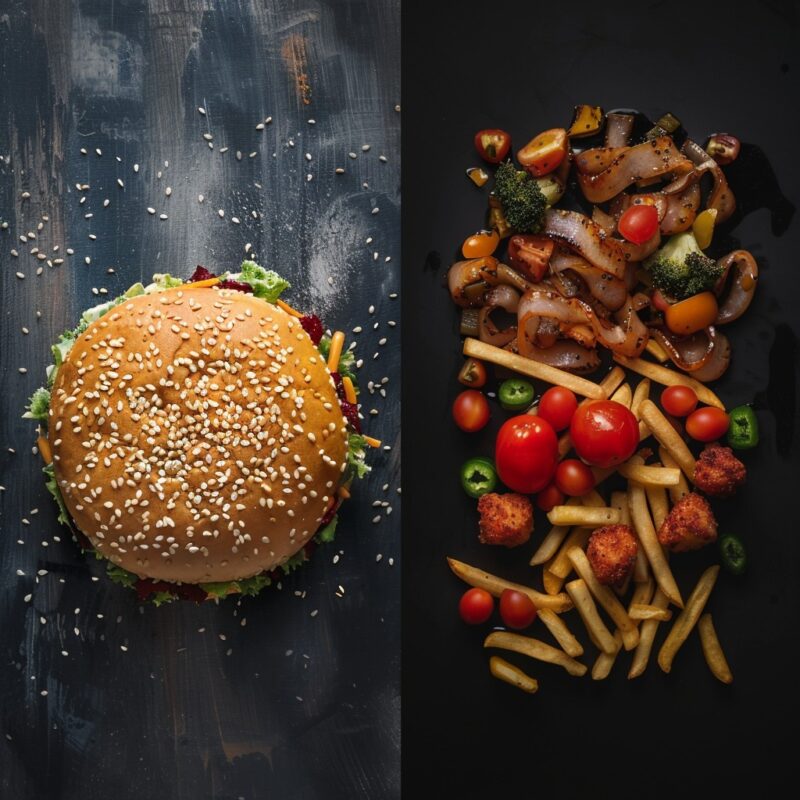
Short-Term and Long-Term Health Outcomes
Fast food, loaded with calories, saturated fats, and a lot of sodium, can really take a toll on someone’s health.
Initially, it might just cause some indigestion or make someone feel unusually tired, not to mention it can lead to quick weight gain.
But the bigger concern comes with the long haul—stick to fast food for too long, and it could ramp up cholesterol levels, setting the stage for some serious health problems like obesity, Type-2 diabetes, and heart issues.
A small controlled trial of 50 adults with type 2 diabetes were randomized to either a 3-month mindful eating intervention that was focused on reducing overeating and improving eating regulation or to a diabetes self-management education (DSME) intervention that was focused on improving food choices. Both groups showed significant improvements in measures of depression, nutrition self-efficacy, and controlling overeating behaviors. Both groups lost weight during the intervention but there was no difference in amount of weight loss between groups according to Harvard T.H. Chan School of Public Health
On the flip side, organic meals paint a much brighter picture.
They’re all about natural, unprocessed ingredients, which means they’re packed with the good stuff—vitamins, minerals, antioxidants.
This isn’t just about eating healthier on a meal-to-meal basis; it’s about laying the foundation for long-term health and wellness.
Choosing organic can lead to better digestion, easier weight management, and even lower the chances of running into chronic health problems down the line.
| Fast Food | Organic Meals | |
|---|---|---|
| Short-Term Effects | Indigestion, lethargy, weight gain | Balanced energy, improved digestion, overall satisfaction |
| Long-Term Effects | Higher cholesterol levels, obesity, Type-2 diabetes, cardiovascular diseases | Weight management, reduced risk of chronic diseases |
Bottom Line
Fast food is quick and easy, but the impact on our health and the planet is too big to overlook.
I choose organic meals because, despite the extra effort and time, the benefits they offer in nutrition, sustainability, and ethics are worth it.
For me, choosing organic isn’t just about food; it’s about choosing a healthier, more responsible lifestyle for ourselves and our world.
Hey there, I’m Marwa Mcintyre. My life’s all about getting hands-on with the earth, championing the cause of growing things the organic way, and sharing what I’ve learned over the years. What is my aim, you ask? To make our planet a bit greener, one garden at a time

